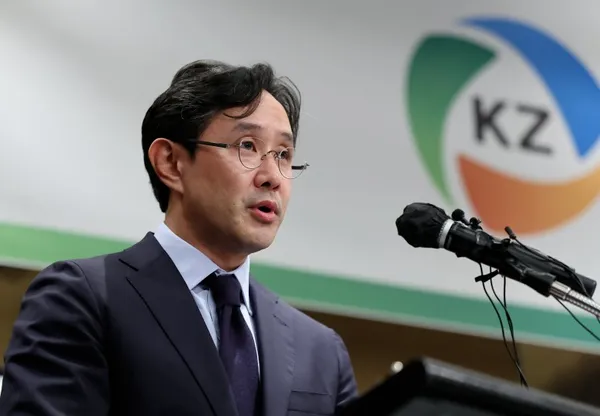
Korea Zinc: MBK & Young Poong Under Fire for Injunction Tactics
Korea Zinc is at the center of a heated battle with MBK Partners and Young Poong over its corporate governance initiatives, sparking widespread scrutiny over the tactics employed by the two challengers. The ongoing feud, which has seen repeated injunction filings by MBK and Young Poong, raises questions about their motives and timing, particularly as these legal maneuvers coincide with significant events such as the suspension of Young Poong’s smelting operations due to environmental violations. Critics argue that these actions not only mislead the market but also undermine the rights of minority shareholders.
Repeated Injunctions and Allegations of Market Disruption
MBK Partners and Young Poong recently filed an injunction to block Korea Zinc’s plan to implement cumulative voting, a system designed to empower minority shareholders. This filing represents yet another attempt to hinder Korea Zinc’s shareholder-friendly initiatives, which have garnered strong support from minority shareholders, civic organizations, and even government bodies.
Just weeks prior, MBK and Young Poong filed another injunction, this time alleging that Korea Zinc intended to dispose of treasury stocks unlawfully. However, when it became apparent that their claims lacked substance and the injunction request would likely be dismissed, they withdrew it quietly and shifted focus to the cumulative voting proposal. This pattern of filing and withdrawing injunctions has drawn criticism from market observers, who see it as a deliberate strategy to create confusion and disrupt Korea Zinc’s operations.
Timing of Legal Actions Raises Concerns
The timing of these legal maneuvers has raised eyebrows. For instance, Young Poong announced an injunction against Korea Zinc shortly after the government issued a 58-day suspension of its smelting operations due to environmental violations, a move upheld by the Supreme Court. Observers speculate that the legal filing was a calculated effort to divert attention from Young Poong’s regulatory troubles. This tactic has fueled skepticism about the true intentions behind the injunctions.
On December 30, 2024, MBK Partners and Young Poong filed yet another injunction to block Korea Zinc’s plan to add cumulative voting to the agenda of an upcoming extraordinary general meeting (EGM) scheduled for January 23, 2025. They argued that while amending the Articles of Incorporation to introduce cumulative voting might be lawful, using it to elect board directors at the same meeting was not. However, Korea Zinc has consistently defended the legality of its actions, citing legal precedents and expert opinions that support its procedural approach.
Legal and Procedural Legitimacy of Cumulative Voting
Korea Zinc’s plan to introduce cumulative voting is rooted in the principles of the Code of Commerce. According to Article 363-2, shareholders are permitted to submit proposals, including amendments to the Articles of Incorporation, provided these are submitted at least six weeks before a shareholders’ meeting. Article 542-7 further affirms that cumulative voting proposals must adhere to the same timeline. Legal experts have pointed out that there are no procedural irregularities in Korea Zinc’s agenda for the upcoming EGM.

Moreover, the Supreme Court has ruled that resolutions adopted at a general shareholders’ meeting take effect immediately upon approval. This means that if shareholders vote to amend the Articles of Incorporation to allow cumulative voting, the subsequent use of cumulative voting to elect board directors is both lawful and valid. Numerous precedents from other companies reinforce this interpretation, demonstrating that similar shareholder proposals have been adopted without legal complications.
Motives Behind MBK and Young Poong’s Actions
The relentless opposition by MBK Partners and Young Poong to Korea Zinc’s initiatives has raised questions about their motives. MBK, which has invested over W1 trillion through profit-seeking liquidity providers, is under pressure to quickly secure control of Korea Zinc’s Board of Directors (BOD) to extract dividends. Meanwhile, Young Poong faces its own crisis, including the suspension of its smelting operations and the challenges of managing hazardous materials such as sulfuric acid. Gaining control of Korea Zinc’s BOD would allow Young Poong to shift these burdens onto Korea Zinc.
Observers argue that the urgency of their actions reflects their immediate financial and operational needs rather than any genuine commitment to improving corporate governance or shareholder value. Their opposition to cumulative voting—a widely recognized tool for enhancing governance and protecting minority shareholders—further underscores this point.
The Importance of Cumulative Voting
Cumulative voting is designed to empower minority shareholders by allowing them to concentrate their votes on specific candidates, increasing their chances of electing representatives to the board. The introduction of this system at Korea Zinc would enable diverse stakeholder representation, including institutional investors like the National Pension Service, minority shareholders, and other civic groups. This diversity could reduce the dominance of the current BOD and management, paving the way for more balanced decision-making.
Korea Zinc’s agenda for the EGM includes other shareholder-friendly measures, such as quarterly dividends, stock splits, new rules to protect minority shareholders, and a cap on the number of board directors. These initiatives aim to enhance shareholder value and corporate transparency, aligning with global best practices in governance.
A Broader Perspective on Governance and Market Integrity
MBK Partners has a history of emphasizing its commitment to improving corporate governance in its dealings with Korean companies. However, its opposition to cumulative voting—a hallmark of good governance—appears contradictory. Critics argue that MBK’s actions are driven more by a desire for immediate control than by adherence to governance principles.
The repeated filing of injunctions with dubious legal grounds also raises concerns about the integrity of market practices. By exploiting legal loopholes and procedural delays, MBK and Young Poong have disrupted Korea Zinc’s operations and eroded market trust. Such tactics undermine the principles of fair competition and shareholder democracy, drawing criticism from various quarters.
The Path Forward
As the January 23, 2025, EGM approaches, the spotlight remains on Korea Zinc, MBK Partners, and Young Poong. The meeting’s outcome could set a precedent for how corporate governance battles are fought in Korea. Minority shareholders, civic organizations, and government bodies have rallied behind Korea Zinc’s initiatives, viewing them as a step toward greater transparency and accountability.
A spokesperson for Korea Zinc emphasized the importance of focusing on substantive proposals rather than engaging in obstructionist tactics. “The market, shareholders, and the general public understand that Korea Zinc’s efforts are aimed at improving governance and enhancing shareholder value. It is time to win shareholder support through compelling proposals rather than opposing for the sake of opposition,” the spokesperson said.
The upcoming EGM represents a critical juncture for Korea Zinc and its stakeholders. Whether the proposed governance reforms will be implemented depends on the ability of shareholders to see through the tactics employed by MBK Partners and Young Poong. As the debate unfolds, the broader implications for corporate governance in Korea will also come into sharper focus.




